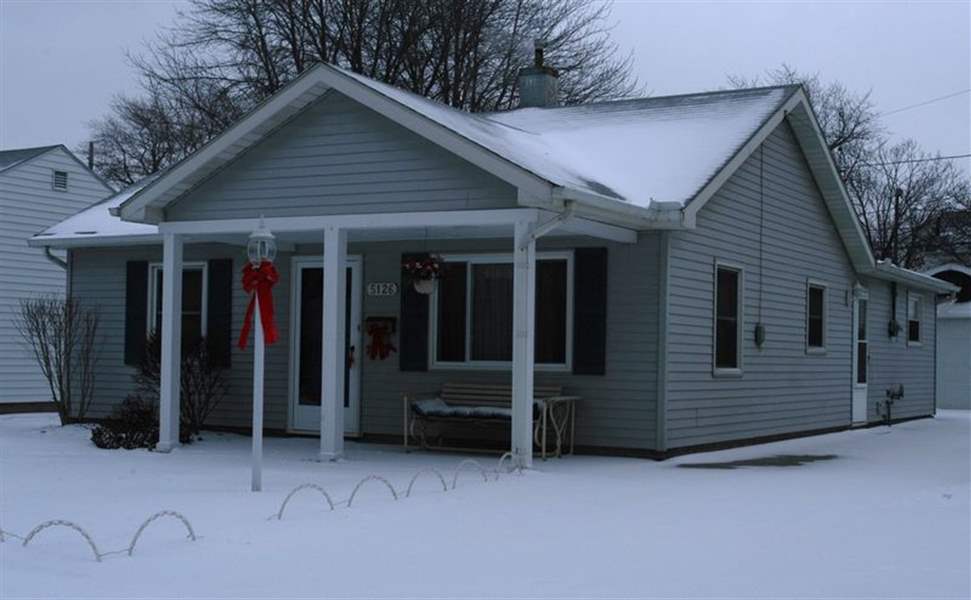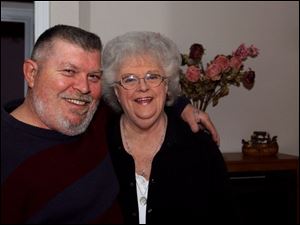
Widening the ownership door
1/23/2005
The home that Ken and Char Hulsey purchases with the help of the FHA.
long / blade

Ken and Char Hulsey, who lost a house when their business failed, purchased a home with the help of the FHA.
When their small trucking company went under, Char and Ken Hulsey lost everything, including their home.
Three years later, the Hulseys are owners of a three-bedroom bungalow in northwest Toledo, thanks to the federal government's Federal Housing Administration. The program insures loans to allow qualified borrowers to get a mortgage with very little money down.
"This is a great program for someone who needs to start all over and doesn't have many resources," said Mrs. Hulsey.
The program has been in existence for 70 years, insuring nearly 33 million properties since it started, and lenders who have been approved by the government to offer it say it is a great way for people to get into homes with as little as 3 percent down.
But the program has a high repayment delinquency rate, at 12 percent of overall loans, six times the rate of non-FHA prime mortgages.
Doug Duncan, senior vice president and chief economist for the Mortgage Bankers Association in Washington, said the program, by its nature, attracts people who are less creditworthy and thus have a higher risk of failing to repay.
The program is getting renewed attention because Patrick Tiberi, a Republican representative from Columbus, has introduced in Congress a bill to require the FHA to insure billions of dollars' worth of mortgages for first-time home buyers who put no money down.
Borrowers would be charged higher premiums, including a 2.25 percent fee, compared with the FHA's normal 1.5 percent fee. Critics contend the delinquency rate under the change could be as high as 30 percent.

The home that Ken and Char Hulsey purchases with the help of the FHA.
Rejecting that argument is Bob Duck, branch manager of the Holland office of Colony Mortgage Corp.
"We do FHA loans any chance we can," he said. He said he has not had a high level of delinquency because he makes sure clients have their credit cleaned up before getting a loan.
The 3 percent down payment can be in the form of a gift from a relative, nonprofit organization, or government agency, and sellers must pay part of the closing costs. Some of the borrower's closing costs can be included in the loan amount.
"I've had people who have bought a house for nothing," Mr. Duck said.
Mrs. Hulsey said she and her husband do not worry about defaulting on their loan because he has a good job at a trucking company and she has a small business at home.
"It wasn't like we were overspending. We just went under in the business," she said.
Jack Howard, president of Erie West Mortgage in Sylvania Township, said he has long written loans under the FHA program, with the average being $125,000.
He said he likes the program because of the flexibility built in. For example, if a borrower doesn't have a strong history of car and credit card loans, a lender can check payment history on rent and utilities.
"There are more competing products now, but the program is a good program," he said.
Stan Kolebuck, vice president of Huntington Mortgage in Toledo, estimated that FHA loans make up about 12 percent of business. He acknowledged the delinquency rate is higher than on traditional loans.
"It's the federal government, willing to be a little more lenient on the underwriting," he said.
For example, home buyers must be out of bankruptcy for four years before a lender will consider them for a traditional loan. Under FHA guidelines, buyers can get loans if their bankruptcy was discharged two years previously.
"FHA loans are user friendly for individuals with some credit dings," Mr. Kolebuck said.
The biggest disadvantage to FHA loans is the mortgage insurance premium. In most 15-year or 30-year FHA loans, the borrower pays 1.5 percent of the loan amount at closing and a 0.5 percent renewal premium annually over the life of the loan.
Unlike private mortgage insurance, this premium isn't canceled when the homeowner's equity reaches a target level.
Some homeowners may qualify for a partial refund of the up-front premium if they sell after owning the home for less than five to seven years.
Ralph Vinciguerra, president of Northern Ohio Investment Corp. in Sylvania, said that, for some customers, private mortgage insurance rates can be much higher than the premium paid under FHA.
Eighteen percent of the business his company does is government loans, either FHA or Veteran's Administration, but the amount has declined because of the proliferation of 100 percent loan-to-value programs on conventional mortgages, he said.
The proposed zero-down-payment bill is a concern, he said.
"It's always been common sense that if someone has something into the house, that loan will perform better than someone who has nothing," he said, acknowledging Northern Ohio's government loans have "slightly higher" delinquencies than traditional loans.
Consumers should shop rates when looking for an FHA mortgage because the figures are established by the lender, not the government, and could be slightly higher than for conventional loans.
Ron Patton, vice president of lending for the Toledo Area Community Credit Union, said he has never bothered to get approval from the government to offer FHA loans because he's had only two requests for them in 12 years. Other lenders now offer similar programs, he added.
Nonetheless, Mortgage Bankers' Mr. Duncan said, "FHA is still the single biggest entry into home ownership for blacks and Hispanics. There's a consensus that is a pretty important role for FHA to play."
Contact Mary-Beth McLaughlin at: mmclaughlin@theblade.com
or 419-724-6199.